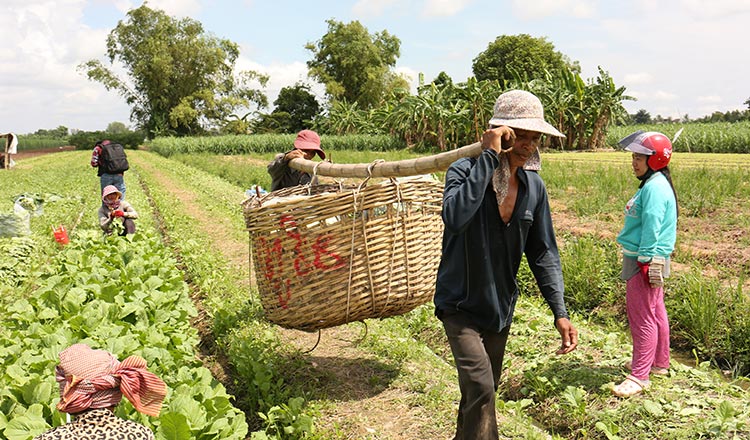Regenerative methods are key to overcoming Cambodia’s agricultural challenges as they directly address critical issues like climate change vulnerability, severe soil degradation, low productivity, and economic instability, a senior official at the Ministry of Agriculture, Forestry and Fisheries (MAFF), observed yesterday.
Chan Saruth, Undersecretary of State, MAFF, and Chair of Conservation Agriculture and Sustainable Intensification Consortium (CASIC) Executive Board, was speaking at the ‘Scaling Regenerative Agriculture in Cambodia: Business and Partnership Forum’ held at the Himawari Hotel Apartments in Phnom Penh, when he made the observation.
“By restoring soil health and biodiversity, these practices build resilience into a farming system that is highly dependent on unpredictable weather patterns,” the official said.
Saruth said agriculture contributes over 16 percent to Cambodia’s GDP and offers employment to something between 35 and 40 percent of the population. “These numbers show how important agriculture is to the country.
“Cambodia’s agricultural sector is at a pivotal moment. To ensure sustainable productivity and safeguard our natural resources, we must adopt regenerative agriculture and agroecological practices that restore soil health, enhance biodiversity, and strengthen farmers’ resilience.
“The Ministry of Agriculture, Forestry and Fisheries is committed to collaborating with partners to expand climate-smart and regenerative farming across our landscapes, creating lasting opportunities for our rural communities.
“Cambodia’s agricultural sector faces increasing pressure from soil degradation, shifting rainfall patterns, and market volatility. Intensive farming has left an estimated 43 percent of agricultural land degraded, and crop yields could decline by up to 30 percent by 2050 under high climate change scenarios.
“Regenerative agriculture offers a practical, locally adaptable solution — restoring soil fertility, improving water retention, reducing dependence on chemical inputs, and supporting safer food.”
It is estimated that less than 5 percent of Cambodia’s farmland currently applies climate-smart practices, such as conservation agriculture, according to the experts who attended the event.
Sun Heng, Programme Manager, Swiss Agency for Development and Cooperation (SDC), said, “The challenges facing agriculture today—climate change, soil degradation, and resource scarcity—can only be solved through partnership. Regenerative agriculture offers a win–win solution that restores nature while strengthening livelihoods. Switzerland is proud to stand with Cambodia, HEKS/EPER, and other partners in scaling these solutions for lasting impact.”
Julien Brewster, Regional Director Mekong at HEKS/EPER, said: “Regenerative agriculture initiatives are already restoring soils, reducing climate risks, and improving livelihoods. The next step is scaling these successes so more farmers benefit. That will require further technical, financial, and policy support, and strong multi-stakeholder collaboration. This forum provides a platform to strengthen this collaboration and accelerate solutions already working on the ground.”
Neou Sovattha, CEO of Impact Hub Phnom Penh, said: “As an Entrepreneur Support Organisation (ESO), Impact Hub Phnom Penh believes that every agricultural business has unique products and services and deserves tailored support, including customised market analysis and targeted assistance. “We’re committed to continuing our collaboration and providing the tailored support needed to help these businesses grow and thrive.”
Speaking to Khmer Times, on the sidelines of the event, Melanie Mossard, Chief Impact Officer, Impact Hub Phnom Penh, said Cambodia is undergoing a transformative journey in terms of introducing regenerative practices.
“The core objective remains to boost the Kingdom’s food security along with the exports of agricultural products. What we need is a comprehensive approach encompassing all stakeholders within the agricultural domain, and this will only facilitate a smooth transition.”
Echoing a similar view, Francesco Melara, Regional Specialist for Market Systems and Climate Resilience Cambodia, HEKS/EPER, told Khmer Times, “It is the perfect time to promote regenerative agriculture. We are aware of the fact that regenerative agriculture will be a powerful instrument to build a sustainable and ecologically-balancing system.
Co-organised by HEKS/EPER and Impact Hub Phnom Penh under the Innovation for Climate Acceleration Project—funded by the UNDP–AFCIA with co-funding from the Swiss Agency for Development and Cooperation through the Nurture Project—the forum served as a platform to accelerate locally led innovation, and partnerships for climate-smart and regenerative farming practices.
Source - https://www.khmertimeskh.com













